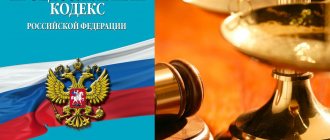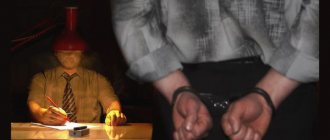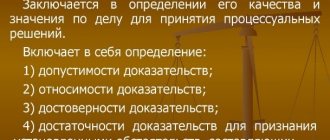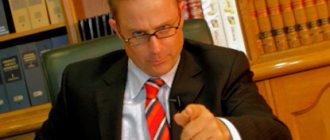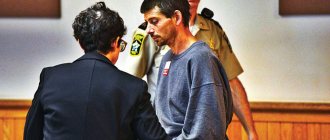Witness in trial
Leonid Evstafievich Vladimirov
The medieval philosopher William of Ockham (known primarily for the extremely useful rule for legal technology “not to create entities unnecessarily”) formulated another – procedurally important – principle: “nothing should be accepted without reason unless it is known either as self-evident or from experience"[1]. Subsequently, this rule was called the law of sufficient reason.
The purpose of the court is to resolve the dispute and bring legal certainty to the relationship between the parties. This is achieved by the procedure of proof, that is, by providing the disputing parties with a factual basis for their statements. That is, what is called the law of sufficient reason, which, in turn, serves as the logical beginning of reliability (principium evidentiae).
A very common type of evidence is witness testimony. But if in a criminal trial the main problem is to establish possibility and probability (what exactly the witness saw and whether he could have seen it at all), then in a civil trial everything is somewhat more complicated. Below is the decision of the Governing Senate, which addresses the issue of witness testimony.
***
The peasant Trushalov sought 68 rubles from the peasants Vasily and Gerasim Antonov. for hemp sold to him by their deceased father, Haggai Antonov, and not delivered to him, and 65 rubles. 50 kopecks losses caused to him by non-delivery of cannabis, citing witnesses as evidence of the claim. Magistrate Judge 1 of the Oryol district, having seen from the testimony and explanations of the defendant Vasily Antonov, that the Antonovs’ father really owed Trushalov 69 rubles, for which he promised to deliver 9 quarters of hemp, and that the price of hemp rose to 9 rubles. 15 kopecks, based on Art. 81 Set. Gr. Court. and 684 X T. 1 hour, ordered the Antonovs to return 68 rubles to Trushalov. and 1 rub. 65 kopecks for each of 9 quarters, only 82 rubles. 85 kop. The Oryol Congress, having considered the case on the defendants’ appeal and finding that, by virtue of Art. 409 Set. Gr. The court, the testimony of witnesses cannot be recognized as evidence of Trushchalov’s claim, overturned the Judge’s decision and denied Trushchalov’s claim. In his cassation appeal against this decision of the Congress, Trushalov explains: 1) that, by recognizing his claim as unproven, the Congress violated Art. 81 Set. Gr. Court., and 2) that, by eliminating testimony as evidence of the claim, the Congress violated Art. 409 Set. Gr. Court., since the purchase of hemp from Antonov and the failure to deliver 9 quarters of the purchased goods can be satisfied by the witnesses.
Having heard the conclusion of the Comrade Chief Prosecutor, the Governing Senate finds that, according to Art. 409 Set. Gr. Court, witness testimony cannot serve as evidence only of those events for which written evidence is required. Applying this law to any dispute, the court first of all (based on Articles 129 and 339 of the Constitution of the Civil Code) is obliged to determine which events constitute the subject of the dispute, and then enter into consideration of the question of what evidence these the controversial events can be proven by law and what evidence is presented in support of them in this case. In the present case, plaintiff Trushalov, referring to witnesses, argued that Haggai Antonov sold him hemp, received money for it, but did not give him all the goods sold; The congress, without discussing at all which of these events is refuted by the defendant and, therefore, appears disputable, found that witness testimony cannot be recognized as evidence of Trushchalov’s claim, while the sale of movable property, under Art. 710 X T. 1 part of the St. Law, can be committed without a written act and, therefore, if the defendant challenged the sale of hemp, the plaintiff had the right, under Art. 409 Set. Gr. Court., prove the sale by reference to witnesses; Likewise, the transfer of sold movable property to the buyer and the payment of money to the seller for this property, under Art. 1510 and 1521 X T. 1 part of the Holy Law, does not require written certification and in case of a dispute can be proven or disproved by the testimony of witnesses. Finding, therefore, that the Oryol Congress, having applied Art. 409 Set. Citizen The court, without proper explanation of what particular event in this case cannot be proven by reference to witnesses, committed a violation of the exact designated article of the Charter, the Governing Senate determines: the decision of the Oryol World Congress, on the violation of Art. 409 Set. Gr. Court., cancel and transfer the case for consideration to the Mtsensk Congress of Magistrates.
***
So the Senate made two important points.
1) Before making a decision, the court must clearly understand what exactly the dispute is about. There were no special rules on preparing a case for hearing, as is done in the modern Code (Articles 148, 150, 152)[2], in the Charter of Civil Proceedings; from the wording of the mentioned 129 and 339 articles[3], the rule of preparation could only be derived through judicial interpretation, which is what the Senate did in this decision.
2) And the main question: is testimony applicable in all cases? In this case, Article 409 of the Civil Code of Civil Code, mentioned more than once by the Senate, was established: witness testimony can be recognized as evidence only of those events for which, by law, written certification is not required[4]. This rule was supplemented by the following - 410 - article on the prohibition of refuting the contents of written acts by the testimony of witnesses (Roman maxim contra scriptum testimonium non scriptum testimonium non fertur - Code, 4.20.1).[5]
Since written form is not required to complete a transaction for the sale and purchase of movable property, there is no reason to limit the evidence base only to documents, as the Senate pointed out in this case.
The question of the applicability of witness testimony was considered very important. For example, in the 2nd volume of Isachenko’s commentary, devoted entirely (1038 pages) to the issue of evidence (Articles 366-565), the commentary to Article 409 occupies 127 pages (from 219 to 346), or 12% of the text (commentary to the main article - 366 – the article on the burden of proof – “only” 65 pages).
In a number of decisions, the Senate formulated other rules for testimony: “it is prohibited to refute by testimony the essence of legal transactions concluded in written acts, but the court is not deprived of the right to resort to testimony to bring to light the existence of such events, circumstances or facts that preceded or accompanied the completion of the transaction" (decision of 1867 No. 122); and on the proof of negative facts by witnesses (decision of 1907 No. 112): “the circumstance (that the testator never had children) as negative cannot be reliably known to the witnesses.”
In light of the above, one cannot help but recall the very relevant debates about the so-called before the privatization of housing and the Housing Code of 2004. recognition as having lost the right to use residential premises. They were based on the fact that one of the family members living (registered) in this apartment allegedly stopped using it and therefore lost the corresponding right. In confirmation of this circumstance, witnesses were cited (usually neighbors), who said that the defendant “does not live here,” or they have not seen him for the last time (week, month, year, etc.). The fact that the question is about changing the lease agreement, and that the landlord is a housing maintenance organization, and only it, as a party to the agreement, can bring such a claim was not taken into account.
[1] William of Ockham. De sacramento altaris, ch. 28.
[2] Unfortunately, the courts take a very formal approach to this issue, limiting all preparation to setting a hearing date.
[3] Here is article 339: the court's decision must be based on documents and other written acts presented by the parties, as well as on the arguments expressed during oral argument. It is curious that here (this article regulates the decision of general courts; article 129 - magistrates' rulings) the Charter says nothing about witness testimony. Evidence is not the testimony of witnesses; arguments are “a legal assessment, a critical analysis of evidence carried out by the parties, considerations through which the connection and relationship of the proven facts to the claim and defense is established” (Grigory Leontievich Verblovsky, Movement of Russian civil procedure, outlined in one example, M., 1905, p. 43); “abstract explanations and illumination from a certain point of view of the circumstances of the case and evidence supporting or refuting them” (Vasily Lavrentievich Isachenko, Civil Procedure. Practical commentary on the second book of the Charter of Civil Proceedings, volume 1, St. Petersburg, 1909, p. 774).
[4] The following are three exceptions—two involving force majeure and one involving “quiet, undisputed, and uninterrupted” possession or enjoyment of real property during the statute of limitations.
[5] Iering said that “the strengthening (fixirung) of an action in a person’s memory is less precise than on paper, extends only to the meaning, and not to the words, which sometimes have enormous meaning.” On the essence of legal formalism in general (from Igering). Journal of the Ministry of Justice, 1860, vol. V, part II, p. 386.
I am lawyer Polit Marianna, have been working as a lawyer since 2005
Any citizen can be a witness in a criminal case.
According to the Law, a witness cannot rely on hearsay or base his testimony on conjecture about a specific event or a specific person.
During questioning, the witness must clearly indicate the source of knowledge on the question being asked.
In accordance with Art. 48 of the Constitution of the Russian Federation and subparagraph 6 of part 4 of article 56 of the Code of Criminal Procedure of the Russian Federation. A witness has the right to appear for questioning with a lawyer in accordance with part five of article 189 of this Code.
Therefore, coming for questioning as a witness to an investigator or to court with a lawyer is normal and safe for you.
Repeated interrogation
Often the parties consider it necessary to declare the re-examination of a particular witness in court, for example:
- after questioning other persons, it became necessary to eliminate contradictions;
- the defendant gave evidence where he spoke about the events, but the witness questioned earlier kept silent about this in his testimony;
- Circumstances arose indicating a discrepancy between the testimony of the previously interrogated person and the established facts.
A request for another interrogation must be especially carefully motivated, because you need to convince the judge that a second procedure is necessary to consider the case. Sometimes a citizen who has already been interrogated earlier, with the permission of the presiding officer, remains in the hall, and questions arise to him while another person is testifying. The judge has the right to simultaneously clarify something with the person remaining in the room; this is called cross-examination.
Here is an example of a court hearing in one of the cases:
Presiding Judge: Witness E.N. Cherkasov, the interrogation is over, I suggest you take a seat in the courtroom, there may be additional questions for you. Secretary, invite witness K.E. Petrov.
Petrov K.E. (enters the hall): Hello.
Chairman: Come in, witness, introduce yourself.
Petrov K.E.: I am Petrov Konstantin Evgenievich, born on November 18, 1990, I live in Moscow, st. Perechnaya, 19.
Presiding Judge: I explain to you the rights and obligations (listed), as well as responsibility for giving false testimony and for refusing to give testimony. You do not have to testify against yourself or your close relatives. Tell me, witness, do you know the plaintiff or the defendant?
Petrov K.E.: No, these persons are not familiar to me.
Presiding: Do you know witness E.N. Cherkasov?
Petrov K.E.: No, I don’t know.
Presiding Judge: Witness E.N. Cherkasov, tell me, do you still insist that you knew K.E. Petrov?
Cherkasov E.N. (located in the hall): Yes, we studied with him in parallel groups at the institute.
Presiding Judge: Witness Petrov K.E., do you insist that you did not know each other?
Petrov K.E.: Sorry, I didn’t immediately remember the appearance of E.N. Cherkasov, indeed, I studied with him and know him.
Chairman: Tell us what you know about the case.
This is how, with the help of simultaneous interrogation of two persons, the court quickly eliminated the contradiction that arose as a result of the testimony. In this case, the method of “cross-examination” was used.
False testimony
Despite the fact that each witness is warned about criminal liability for giving false testimony, there are often situations when a citizen reports information that is clearly inconsistent with the circumstances of the case. In such situations, it is possible to initiate a criminal case by sending a statement to law enforcement agencies, but only if there is reliable information about the intent of the interrogated person. After all, sometimes people are called to court months or even years after the events and may not remember everything (for example, as in our example, the witness simply forgot the appearance of the person he was asked about).
Due to forgetfulness, testimony may be given that differs from the pre-trial one. The indictment contains the testimony of all participants in the criminal case (this is a mandatory requirement of the criminal procedure law). During the in-person interrogation, both the lawyer and the state prosecutor monitor the content of the testimony that was given during the investigation and compare it with what was heard in court. If there are significant contradictions, each party has the right to file a motion to have the previous testimony read out. The court, making sure that there are contradictions, almost always agrees with the petition. In the presence of the witness, the interrogation protocol is read out, and clarifying questions are asked. If the contradictions are eliminated, to initiate a criminal case under Art. 307 of the Criminal Code of the Russian Federation is out of the question.
At the same time, when a witness deliberately changed his testimony and openly lies, he faces a fine of up to 80,000 rubles , as well as compulsory or correctional labor. Those who provided false information to the court and this resulted in another person being held accountable for committing a grave or especially grave crime may be punished by imprisonment for up to 5 years .
We remind you that from liability under Art. 307 of the Criminal Code of the Russian Federation, release is possible if a person confesses to lying before the verdict in the case is pronounced.
Learn more about liability for perjury.

